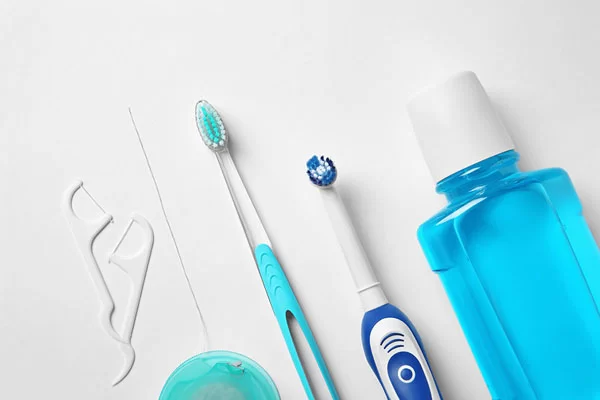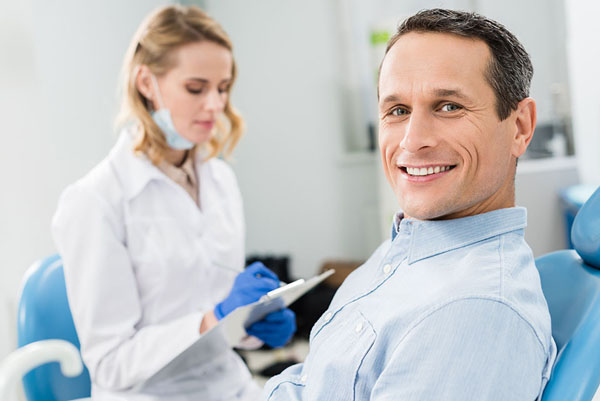Key Takeaways
- Dental implants require the same daily care as natural teeth—brushing twice a day, flossing, and using antimicrobial mouthwash.
- Use soft-bristled toothbrushes, low-abrasive toothpaste, and implant floss or water flossers to protect your implants.
- Schedule professional cleanings and exams every six months with our Hilliard dentist to maintain implant health.
- Avoid smoking, hard foods, or teeth grinding, as these increase the risk of implant failure.
- Watch for signs like bleeding gums, swelling, looseness, or gum recession, and contact our dental office immediately.
Dental Implant Care Tips from Your Dentist in Hilliard, OH
Dental implantsare one of the most trusted and permanent solutions for replacing missing teeth. With proper care, they can last decades and give you the confidence of a secure, natural-looking smile. At our Hilliard dental office, Dr. Nathan Desai and our professional team help patients protect their investment with personalized care instructions and ongoing support.
Whether you’ve just received dental implants or are researching options to replace lost teeth, knowing how to maintain them is key to long-term success.
Call our dental office near you today at (614) 771-6060to schedule an appointment with our implant dentist in Hilliardand learn more about keeping your implants healthy. We proudly serve patients from Columbus, Dublin, Upper Arlington, Grove City, Westerville, and across Central Ohio.

How to Care for Your Dental Implants
Brush Twice Daily with the Right Tools
Dental implants should be brushed just like natural teeth, twice daily. Use a soft-bristled or implant-specific toothbrush to avoid scratching your crown or irritating your gums. Electric toothbrushes with oscillating heads are especially effective.
Pro Tip:Choose a non-abrasive toothpaste (RDA under 70). Avoid whitening pastes with harsh ingredients that may damage the restoration.
Floss Daily to Protect Your Gums and Bone Health
Food and plaque can collect under the gumline around implants. Daily flossing with implant floss, unwaxed tape, or a water flosser helps protect bone health and prevent peri-implantitis (a serious infection that can damage the jawbone).
Pro Tip:Ask our dentist or hygienist to demonstrate the safest flossing techniques for implants during your next visit.
Rinse with Antibacterial Mouthwash
Alcohol-free antibacterial rinses reduce harmful bacteria and support gum health around your implant. This is especially helpful if you’re prone to gum issues.
Consider Interdental Brushes
If you have fixed implant bridges or wider spaces, interdental brushes are excellent for removing debris. Always choose the correct size to avoid putting pressure on your gums or implant crown.
Routine Visits to Our Hilliard Dental Office
Professional cleaningsand x-rays are essential to check how your implant fuses to the jawbone (a process called osseointegration). During these visits, our dentist examines your implants, removes tartar, and ensures your bite and restorations are functioning properly.
Risks of Poor Implant Care
Without consistent dental care, problems may develop around implants:
- Peri-implantitis:Inflammation and bone loss around the implant. Symptoms include redness, bleeding, or swelling. Treatment may involve antibiotics, deep cleaning, or surgery.
- Loose implant or abutment screw:If your implant feels wobbly, schedule a dental emergency visit immediately.
- Broken dental crownor bridge:Restorations may crack due to wear, trauma, or chewing hard foods. Our dentist can repair or replace them.
- Gum recession:Receding gums can expose implant posts. Gum grafting or other periodontal treatments may be needed to restore health.
If you notice pain, bleeding, or changes around your implant, contact our dentist in Hilliard right away at (614) 771-6060.
Why Implant Care Matters
Dental implants are a permanent solution for missing teeth, but their success depends on daily care and routine professional maintenance. Benefits include:
- Longevity:With proper care, implants can last a lifetime.
- Oral Health:Prevents gum disease and bone loss.
- Aesthetics:Keeps your smile looking natural and beautiful.
- Cost Savings:Reduces risk of expensive repairs or replacements.

Frequently Asked Questions
How often should I visit the dentist after getting dental implants?
Most patients should schedule dental visits every six months. Our Hilliard dentist provides implant-focused exams and cleanings to protect your implants and overall oral health. These visits also include professional X-rays to monitor jawbone health.
What’s the best toothpaste for dental implants near me in Central Ohio?
Look for low-abrasive pastes like Sensodyne or Tom’s of Maine. Many Columbus-area pharmacies also carry implant-safe options. Ask our dental team for personalized recommendations during your next visit.
How do I know if my implant is failing?
Warning signs include loose implants, gum swelling, pain, or gum recession. If you notice any of these, call our Hilliard dental office right away for an emergency evaluation. Early treatment can save your implant.
What habits should I avoid after getting implants?
Avoid smoking, chewing ice or hard candies, and using your teeth to open packages. If you grind your teeth, a custom nightguard can help protect your implants.
Long-Lasting Dental Implants at Fishinger Dental
Caring for dental implants is simple, but it requires consistency and the right guidance. At Fishinger Dental, our entire staff is committed to helping patients in the Hilliard area enjoy positive experiences and healthy, lasting smiles.
If you’re ready to restore your smile and protect your dental implants, contact our Hilliard dental office today at (614) 771-6060. We proudly serve families from Columbus, Dublin, Upper Arlington, Grove City, Westerville, and surrounding Central Ohio communities.





